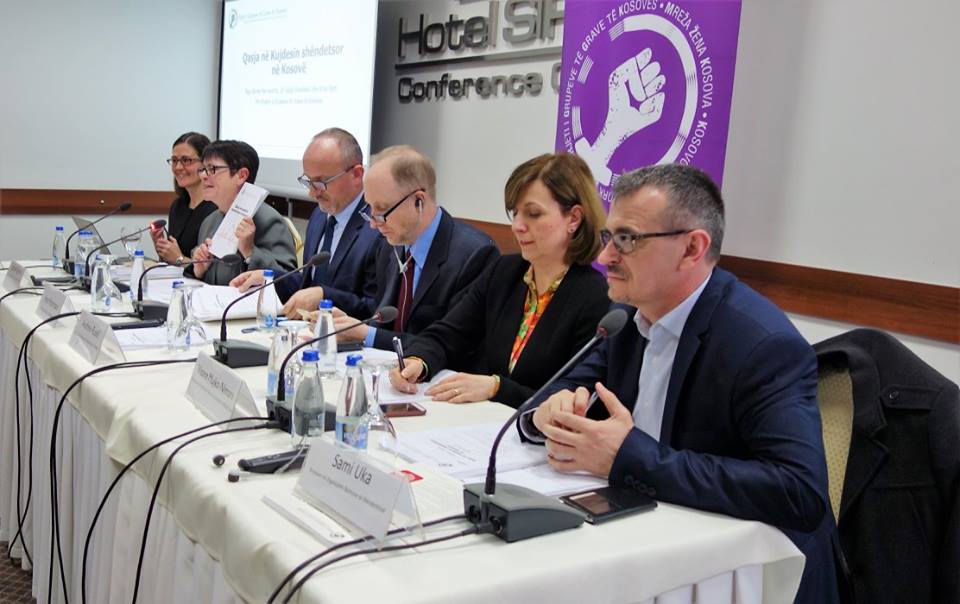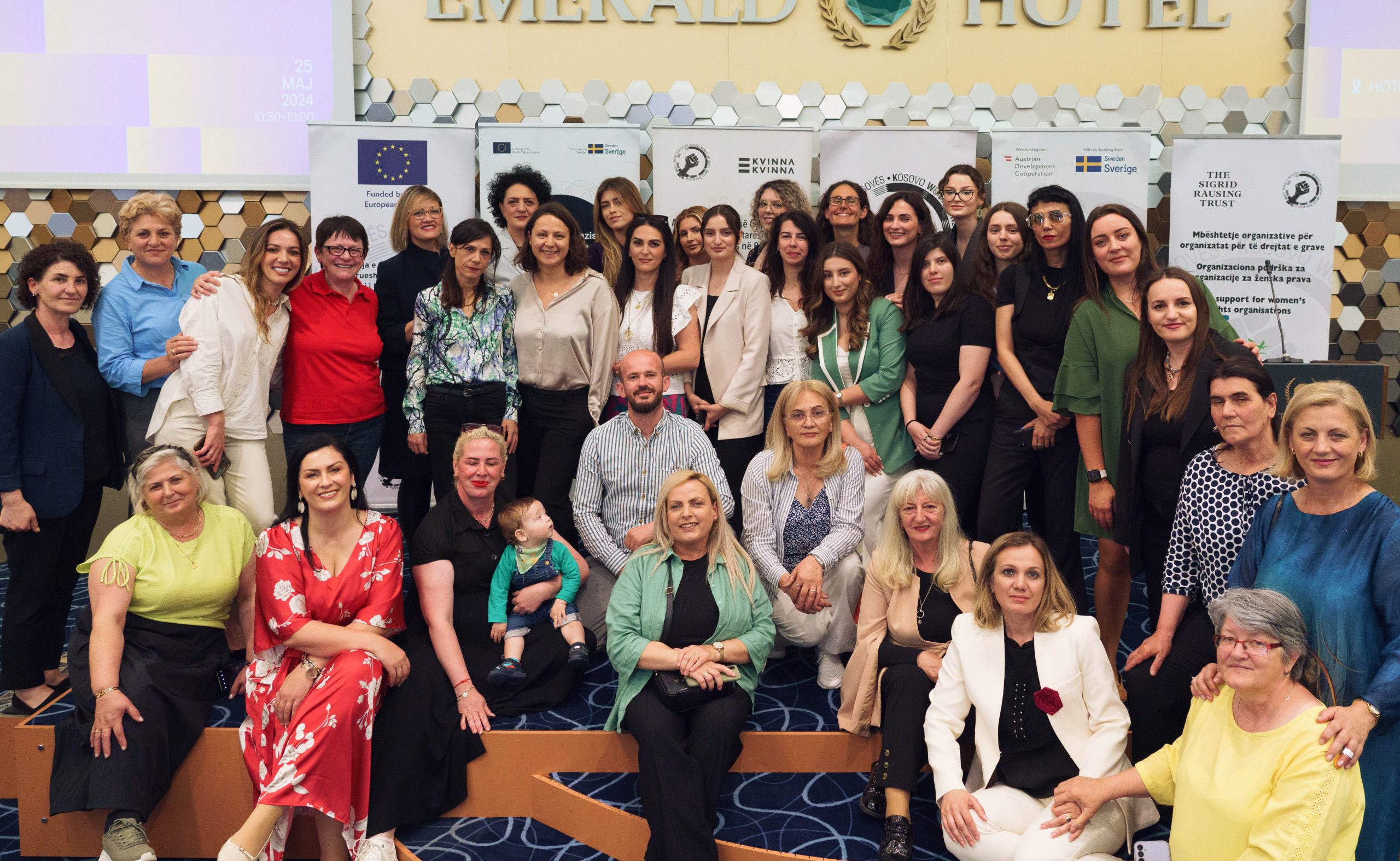The Kosovo Women’s Network (KWN) officially launched the first ever comprehensive research on women’s and men’s access to healthcare in Kosovo on 2 February 2017 at Hotel Sirius.
The event was attended by Dr. Imet Rrahmani, Minister of Health; Andrew Russell, United Nations Development Coordinator and United Nations Development Programme Resident Representative; Dr. Visare Mujko-Nimani, Programme Specialist, Officer in Charge, United Nations Population Fund; and Dr. Sami Uka, National Professional Officer, World Health Organization. Members of parliament, municipal assemblies, civil society organizations and other officials also attended.
“If we do not have healthcare for women and men, it is a matter of life and death,” stated Igballe Rogova, KWN Executive Director in her opening remarks, explaining the cover of this new report. Access to quality healthcare is an urgent and important issue for everyone, she said.
The Government of Kosovo has a legal obligation to safeguard and ensure all persons in Kosovo have the right to health. Institutions also are obliged to collect and publicize gender disaggregated data in accordance with the Law on Gender Equality. However, to date, Kosovo has lacked important information pertaining to women’s and men’s access to quality healthcare.
The KWN Strategy for 2015-2018 identified health as an important issue. Therefore, in 2016, KWN undertook research in an attempt to address this dearth of information. Conducted in close cooperation with Dartmouth College, the University of Prishtina and a team of more than 30 dedicated volunteers, the mixed methods research involved a household survey of 1,309 Kosovars and interviews with 110 respondents, including diverse healthcare practitioners across Kosovo.
The resulting report examines the extent to which Kosovars utilize public and private healthcare services; encounter financial, geographic, ethnic, cultural and/or knowledge barriers in accessing healthcare; and are aware of their rights as patients. This report examines differences in access to healthcare based on gender, ethnicity and residency. Recommendations focus on areas requiring additional research, awareness-raising opportunities and policy options.
“This is a very important report for many actors,” said Dr. Syla, “and for women’s access to healthcare specifically.”
Some of the key research findings include:
• Overall, 81% of Kosovars considered their health status to be good or very good.
• Women assessed their health status slightly worse than men did.
• 23% of Kosovars report a limitation in daily life due to health reasons.
• 54% of survey respondents never had a general health examination.
• 26% of respondents said that at least one time in the last year they should have consulted a doctor, but did not. Similarly, 18% did not consult a dentist when they needed to.
• Very few people had used screening tests to detect cancer.
• Key barriers to accessing healthcare included people’s tendency to “wait and see” if their health will improve; financial barriers; insufficient knowledge of where which types of healthcare are available; social stigma, particularly related to accessing mental healthcare; and insufficient confidentiality among healthcare workers.
• Only 6% of Kosovars have private health insurance, with women in rural zones having even less access.
• Only 35.3% of respondents knew that Main Family Medicine Centres provide reproductive health services.
• While 59.2% of respondents preferred using public healthcare facilities, mostly due to their price, 32.3% preferred private clinics, primarily for the quality of care offered.
• 20.5% of all respondents and 10.9% of women reported using modern contraceptives.
The right to health is a “basic right of people,” reaffirmed Minister Rrahmani, who remained present throughout the event, responding to questions and concerns raised both by the report and participants. “Health always requires more work,” he said. “We always go from one problem to another.” He emphasized the Ministry’s commitment to improving the quality of healthcare in Kosovo in collaboration with other actors.
In the end, Dr. Visare Mujko-Nimani emphasized that it is also up to citizens to utilize healthcare services; they cannot wait for services to come to them. “We have to request these services,” she said. “We need to focus on prevention,” she added.
The research and report itself cover several issues not discussed during the launching event, noted Nicole Farnsworth, a co-author and KWN Lead Researcher, including related to alcohol consumption, cigarette usage and people’s perceptions of the environment in Kosovo and how it may impact their health.
Mr. Russell emphasized the importance of addressing serious environmental issues in Kosovo that are contributing to poor health. “We do not like going to so many funerals here,” he said, as a foreigner living temporarily in Kosovo. “It strikes us how many of our colleagues die … far too young and far too easily.” The environment in Kosovo is “actually killing us; Kosovo A, Kosovo B, Kosovo C, these cars and how we heat our homes, all contribute to this,” he said.
This research was conducted with support from and in collaboration with the Kosovo Ministry of Health, Dartmouth College, the University of Prishtina, the United Nations Population Fund (UNFPA), the World Health Organization (WHO), the United Nations Development Programme (UNDP) and UN Volunteers.







